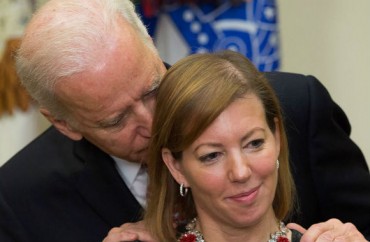
Lady Gaga and Vice President Joe Biden told the Academy Awards audience last night to join the “It’s On Us” movement against sexual assault “on and off” campus, building on the work of the disputed (and Oscar-snubbed) documentary The Hunting Ground.
Days before that call to action that reached hundreds of millions of people, however, a Barnard College student told her peers to closely scrutinize statistics that claim to prove “rape culture” is rampant on campus.
Columbia Daily Spectator columnist Toni Airaksinen wrote she was taken aback by the “ridiculously wide definition” of sexual assault, covering “everything from penetration to unwanted groping,” in last year’s nationwide Association of American Universities survey:
When I hear the term “sexual assault,” I think of rape. … Some people, on the other hand, just think of unwanted touching or even street harassment. And while the term “sexual assault” has a legal definition, in reality, it often means different things to different people. As such, the [commonly cited] one in five statistic has the potential to be interpreted in vastly different ways by different people.
These differing interpretations also have the potential to rob women of their agency to define what constitutes sexual assault. If I was at a dinner party and a man kissed me without my consent, it would be majorly uncomfortable. Still, I would consider it a minor incident and chalk it up to pathetic male entitlement, drunkenness, or mixed signals. I would absolutely not consider it sexual assault. However, if I recounted that experience in response to the AAU survey, my experience would put me in the survivors camp.
If I were to accept the language AAU uses, I would not get to decide whether I have been a victim of sexual assault.
RELATED: The massive new campus sexual-assault survey has one giant design flaw
Only when you look closely at the survey results does it become clear that the vast majority of supposed assaults are nowhere near an assault, Airaksinen says:
If we look at the statistics, only 5.3 percent of female students were “victims of a sexual assault involving penetration by incapacitation.” Later, we see that the “primary reason” why such incidents weren’t reported is because the female did not believe that the incident was serious enough.
The survey is also sexist in that it makes victims out of female respondents who were drinking but refuses to say “what percentage of males were drinking while the women were,” she says:
I know that after tossing back a couple of glasses of wine, I would certainly be more willing to have sex. If I answered the survey truthfully, I would be considered a victim. But if I’m the victim of assault because I had unwanted sex after topping off a bottle of wine, then what about the person whom I had sex with, who was probably drinking, too?
Airaksinen’s column provoked a strong response from a self-proclaimed survivor who was not “violently raped,” who said arguing over statistics was pointless because “one person being sexually assaulted on our campus is too many”:
I am tired of being blamed for what happened to me, and I will not sit back while victims are shamed into silence on our campus. Yes, an unwanted kiss is very different from penetration—but sexual assault is sexual assault. Rape is rape, and it does not have to be violent to be traumatic. There is no such thing as a perfect, “true” rape victim. And the involvement of alcohol on either side should not immediately discredit a victim’s claim.
Read Airaksinen’s column and the response letter.
RELATED: Skepticism grows the more closely you look at the data in the latest sexual-assault survey
Like The College Fix on Facebook / Follow us on Twitter
IMAGE: YouTube screenshot






Please join the conversation about our stories on Facebook, Twitter, Instagram, Reddit, MeWe, Rumble, Gab, Minds and Gettr.